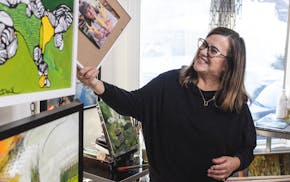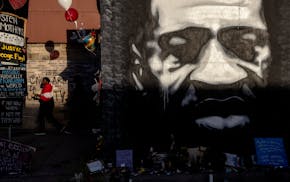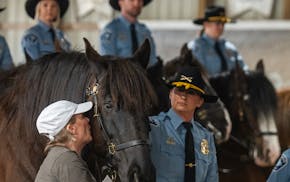The Democratic nominee for vice president has no law degree or Ivy League pedigree, no famous last name or massive wealth. But his former students say the kind of teacher that Minnesota Gov. Tim Walz was back then is who he is today — qualities that could help him govern and unify the nation.
Take Noah Hobbs. Roughly two decades ago, Hobbs was a "C-ish" student at Mankato West High School and chronically late to class. He says there was no good reason most teachers would have gone out of their way to notice, much less appreciate, an average kid like him.
But he says his fourth-hour global geography teacher, Mr. Walz, did. Hobbs credits Walz for letting him feel seen and important at a time in his life when that meant everything.
"He spent as much time with me as he did with the 4.0 kids," said Hobbs, who later served on the Duluth City Council and works for an affordable-housing nonprofit. "He certainly helped me feel that I was capable of more than what I was doing. I think he saw that in all of us."
After being introduced by Kamala Harris as her running mate Tuesday at a rally in Philadelphia, Walz recounted how his students inspired him to run for political office in 2006. Many of his former students, now in their 30s and 40s, say it was Walz who inspired them, drawing them in with his boisterous-dad energy, caring curiosity and engaging teaching style. (Walz was named the "most inspiring" teacher by the student yearbook.)
Hobbs remembers earning extra credit in Walz's class by talking about current events he read in the news. At the time, the teen delivered papers for the Mankato Free Press. Having Walz as a teacher forced him to page beyond the funnies and the sports section, to physically open up the paper and realize there was a world much broader beyond North Mankato.
A New York Times article documented how Walz helped his students predict the Rwandan genocide when he taught high school in Alliance, Neb., in 1993, by having them study patterns of civil war and totalitarianism. Too often, he told the Times in 2008, atrocities like the Holocaust are taught as a terrible anomaly that could never take place again.
"The problem is, that relieves us of responsibility," he said at the time. "Obviously, the mastermind was sociopathic, but on the scale for it to happen, there had to be a lot of people in the country who chose to go down that path. You have to make the intellectual leap to figure out the reasons why."
Jill Walker credits Walz for encouraging her to learn beyond the four walls of a classroom.
She was one of a group of students whom Walz and his wife, Gwen, an English teacher at Mankato West, took to China in the summer of 1997. They traversed the Great Wall, hiked through rainforests, practiced tai chi and visited Hong Kong just days after the British handed it back to Chinese rule.
"He helped mold me into a new way of thinking," said Walker, now a 44-year-old attorney. "Yeah, I can read about China in a book, but if I go there, think how impactful that could be. Outside my father, he was probably the second most inspirational and influential man that I had growing up."
Walker says other indelible experiences with Walz happened right in Mankato, like when they served on the prom committee together. The theme of the dance was "Tropical Enchantment," and they laboriously built a 7-foot-tall decorative waterfall made of teal tinsel. "There were some high-pressure moments, but we pulled together," she deadpanned.
Students also knew that Walz was hard of hearing in one ear, so the ongoing joke was that they could get away with more on the left side of the classroom, she said.
Once a week, the treat for many of Walz's students was to play "Jeopardy" to review class material. In this still-analog era, Walz had built a game board by assembling pockets into a giant piece of tagboard, each preloaded with a question scribbled onto an index card, said former student Mike Breyer.
Walz's ability to capture a classroom was not lost on Breyer, who went on to become a social studies teacher for 20 years. Breyer got to know Walz further through football, before Mankato West was a powerhouse in the sport. (You may have heard maybe a dozen times in the past few days that Walz coached football and yes, helped lead the team to a state championship.)
"People know Coach Walz for the winning, but he was a pretty great coach even when we weren't winning," Breyer said. "My junior year we didn't win a single game. We didn't even score a touchdown until the second to last game of the season."
Walz kept the team upbeat and positive, Breyer recalled. He reminded the kids to believe in the process — that their hard work would produce results, if not reflected in the scores then by the influence they'd leave on younger players.
In 1999, Walz agreed to be the faculty adviser for a new gay-straight alliance at the high school after seeing some of his gay students bullied. At the time, Walz was an enlisted soldier in the Minnesota National Guard, and openly gay people were banned from serving in the military. It took courage for Walz to stand up for his students in a conservative-leaning community, said Jillian Hiscock, a graduate of Mankato West who came out in her 20s as a lesbian.
"There's toxic masculinity wrapped into a lot of the things that Tim represented, and here he was taking this step and saying, 'It's possible for you to be tough and macho on the football field and in the military, and it's possible for you to believe that people can love who you want to love. You can be both.' The care and concern he's felt for his students has been around forever."
Hiscock, 41, who owns the Minneapolis women's sports bar, A Bar of Their Own, knew Walz as an adviser to the school's youth and government club. She never recalled him steering her into a particular agenda. But he did ask his students to think critically and think of how they could use their politics for good.
After being elected into Congress, Walz returned to the high school to speak to an AP Government class. Once again, Hobbs, the habitually tardy student, was running late. He peered through the tiny window of the shut classroom door, realizing the event had started, and was about to turn away to leave.
"The door opens, and Mr. Walz without skipping a beat, says, 'Some things never change. I saved a seat for you.' It was right there in the front row," Hobbs said. "He didn't forget me. It speaks to the genuine level of care that he took to know and remember minor things about all of his students."
It's quite possible other alumni of Mankato West might have had less memorable or even negative experiences with Walz. And no doubt former students will vote this November not just on their memories of him as a teacher, but on his policies and how he governed. The days of rioting following the police killing of George Floyd and how Walz handled the pandemic are important lenses through which one can evaluate his ability to lead in a crisis. That all matters ― and so does character.
The students I talked to remember Walz as someone who stood up to bullies, who cared for the invisible, who invited respectful conversation, who delivered joy in the day-to-day, and who inspired a generation of young people.
If you know a teacher like this one, you know that they can change the world.

Yuen: When cancer struck a second time, she found 'euphoria'

Yuen: The University of Minnesota's first male dance team member is turning heads by staying real
Yuen: How George Floyd's aunt healed her heart and lent her voice for justice

'This is an uprising': An oral history of the 6 days after George Floyd's murder


